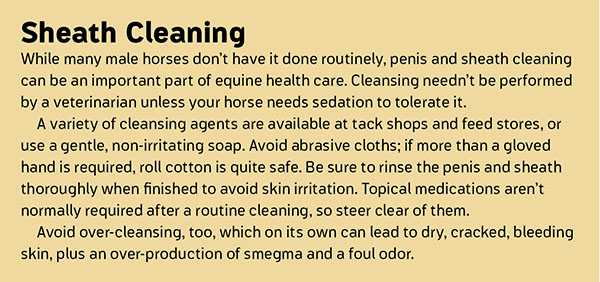Q My 18-year-old gelding was only recently castrated, and when I got him he had an ugly, chafed, bleeding penis. It’s goopy and “sheds” a lot, and it smells bad, too. He doesn’t act as if it hurts. Why does this happen and what can I do for him?

DAYNA GILLHAM, Illinois
A First, some basics. Smegma is the thick, oily secretion that covers the penis and interior of the sheath in stallions and geldings. It’s produced by the sebaceous glands in the skin of the sheath, and some horses make more of it than others. The “bean��� that can form in the urethra at the tip of the penis is made of smegma. (Though beans can become quite large, they typically don’t prevent the horse from urinating properly.) Smegma is also responsible for the unpleasant odor associated with some horses’ sheaths. Some horses require relatively frequent cleaning to minimize the odor from smegma, while others can be cleaned just once or twice a year; over-cleaning can itself cause problems (see box).
If smegma is accumulating more rapidly or has a stronger odor than normal, or is accompanied by any bleeding, your veterinarian should conduct a thorough examination of the penis and sheath. This is especially critical for older horses like yours, where bleeding or excessive amounts of foul-smelling smegma can be an indication of a cancerous condition such as squamous-cell carcinoma. Bleeding can also be caused by masturbation in stallions and recently castrated geldings, as the behavior leads to physical trauma of the penile skin. Close monitoring of behavior can determine if this is the cause.
Balanoposthitis, or inflammation of the penis and sheath, is treated by gentle cleansing plus administering antibiotics and anti-inflammatory medications. Your vet will determine the need for these medications, which shouldn’t be administered prior to a thorough exam. Your vet may also recommend a topical medication to help soothe irritated skin. (In breeding stallions, abnormalities of the penis and sheath should be examined immediately to rule out venereal diseases that can be transmitted through live-cover breeding or artificial insemination.)
Though you typically don’t need a professional to clean your horse’s sheath, a thorough examination of your horse’s problematic penis by a veterinarian enables prompt detection of cancer or other diseases that can be most easily treated in the early stages of development.

MELISSA MILLIGAN, DVM, MS
equinespecialtyhospital.com
Burton, Ohio






